- Home
- Tony Hillerman
The First Eagle jlajc-13 Page 4
The First Eagle jlajc-13 Read online
Page 4
"Anything I can do?" Chee asked.
Leaphorn put the notebook back in his pocket.
"You know how I am about coincidences," he said.
"Yep," Chee said.
"Well, this one is so strained I hate to even mention it-" He shook his head.
Chee waited.
"From what I know now, the last time anyone heard of this woman, she was heading out of Tuba City checking on prairie dog colonies, looking for dead rodents. One of the places on her list was that area around Yells Back Butte."
Chee thought about that a moment, took a deep breath, thinking he'd been too optimistic. But "that area around Yells Back Butte" didn't make it much of a coincidence with his Kinsman case. That "around" could include a huge bunch of territory. He waited to see if Leaphorn was finished. He wasn't.
"That was the morning of July eighth," Leaphorn said.
"July eighth," Chee said, frowning. "I was out there that morning."
"I was thinking that you were," Leaphorn said. "Look, I'm headed to Window Rock now and all I know now is from some preliminary checking a lawyer did for Pollard's aunt. I couldn't reach Pollard's boss on the telephone and soon as I do, I'll go to Tuba and talk to him. If I learn anything useful, I'll let you know."
"I'd appreciate that," Chee said. "I'd like to know some more about this."
"Probably absolutely no connection with the Kinsman case," Leaphorn said. "I don't see how there could be. Unless you know some reason to feel otherwise. I just thought—"
A loud voice from the doorway interrupted him.
"Chee!" The speaker was a beefy young man with reddish-blond hair and a complexion that suffered from too many hours of dry air and high-altitude sun. The coat of his dark blue suit was unbuttoned, his necktie was slightly loose, his white shirt was rumpled and his expression was irritated. "Mickey wants to get this damned thing over with," he said. "He wants you in there."
He was pointing at Chee, a violation of the Dine rules of courtesy. Now he beckoned to Chee with his finger—rude in a multitude of other cultures.
Chee rose, his face darkened a shade.
"Mr. Leaphorn," Chee said, motioning toward the man, "this gentleman is Agent Edgar Evans of the Federal Bureau of Investigation. He was assigned out here just a couple of months ago."
Leaphorn acknowledged that with a nod toward Evans.
"Chee," Agent Evans said, "Mickey is in a hell of a—"
"Tell Mr. Mickey I'll be there in a minute or so," Chee said. And to Leaphorn: "I'll call you from the office when I know what we have."
Leaphorn smiled at Evans and turned back to Chee.
"I am particularly interested in that Jeep," Leaphorn said. "People don't just walk away from good trucks. It's odd. Someone sees it, mentions it to someone else, the word gets around."
Chee chuckled. (More, Leaphorn suspected, for Evans's benefit than his own.) "It does," Chee said. "And pretty soon people begin deciding no one wants it anymore, and parts of it begin showing up on other people's trucks."
"I'd like to spread the word that there's a reward for locating that Jeep," Leaphorn said.
Evans cleared his throat loudly.
"How much?" Chee asked.
"How does a thousand dollars sound?"
"About right," Chee said, turning toward the door. He Motioned to Agent Evans. "Come on," he said. "Let's go."
Officer Benjamin Kinsman's room was lit by the sun pouring through its two windows and a battery of ceiling fluorescent lights. Entering involved slipping past a burly male nurse and two young women in the sort of pale blue smocks doctors wear. Acting Assistant U.S. Attorney J. D. Mickey stood by the windows. The shape of Officer Kinsman lay at rigid attention in the center of the bed, covered with a sheet. One of the vital signs monitors on the wall above the bed registered a horizontal white line. The other screen was blank.
Mickey looked at his watch, then at Chee, glanced at the doors and nodded.
"You're the arresting officer?"
"That's correct," Chee said.
"What I want you to do is ask the victim here if he can tell you anything about who killed him. What happened. All that. We just want to get it on the record in case the defense tries something fancy."
Chee licked his lips, cleared his throat, looked at the body.
"Ben," he said. "Can you tell me who killed you? Can you hear me? Can you tell me anything?"
"Pull the sheet down," Mickey said. "Off of his face."
Chee shook his head. "Ben," he said. "I'm sorry I didn't get there quicker. Be happy on your journey."
Agent Evans was pulling at the sheet, drawing it down to reveal Benjamin Kinsman's waxen face.
Chee gripped his wrist. Hard. "No," he said. "Don't do that." He pulled the sheet back in place.
"Let it go," Mickey said, looking at his watch again. "I guess we're done here." He turned toward the door.
Standing there, looking in at Chee, at all of them, was Janet Pete.
"Better late than never," Mickey said. "I hope you got here early enough to know all your client's legal rights were satisfied."
Janet Pete, looking very pale, nodded. She stood aside to let them pass.
Behind Chee the medical crew was working fast, disconnecting wires and tubes—starting the bed rolling toward the side exit. There, Chee guessed, Officer Benjamin Kinsman's kidneys would be salvaged, perhaps also his heart, perhaps whatever else some other person could use. But Ben was far, far away now. Only his chindi would remain here. Or would it follow the corpse into other rooms? Into other bodies? Navajo theology did not cover such contingencies. Corpses were dangerous, excepting only those of infants who die before their first laugh, and people who die naturally of old age. The good of Benjamin Kinsman would go with his spirit. The part of his personality that was out of harmony would linger as a chindi, causing sickness. Chee turned away from the body.
Janet was still standing at the door. He stopped. "Hello, Jim."
"Hello, Janet." He took a deep breath. "It's good to see you."
"Even like this?" She made a weak gesture at the room and tried to smile.
He didn't answer that. He felt dizzy, sick, and depleted. "I tried to call you, but you're never home. I'm Robert Jano's counsel," she said. "I guess you knew that?"
"I didn't know it," Chee said. "Not until I heard what Mr. Mickey said."
"You're the arresting officer, as I heard? Is that right? So I need to talk to you."
"Fine," Chee said. "But I can't do it now. And not here. Somewhere away from here." He swallowed down the bile. "How about dinner?"
"I can't tonight. Mr. Mickey has us all conferring about the case. And, Jim, you look exhausted. I think you must be working too hard."
"I'm not," he said. "And you look great. Will you be here tomorrow?"
"I have to drive down to Phoenix."
"How about breakfast then? At the hotel."
"Good," she said, and they set the time.
Mickey was standing down the hallway. "Ms. Pete," he called.
"Got to go," she said, and turned, then turned back again. "Jim," she said, "tired or not, you look fine."
"You, too," Chee said. She did. The classic, perfect beauty you see on the cover of Vogue, or on any of the fashion magazines.
Chee leaned against the wall and watched her walk down the hall, around the corner and out of sight, wishing he had thought of something more romantic to say than "You, too." Wishing he knew what to do about her. About them. Wishing he knew whether he could trust her. Wishing life wasn't so damned complicated.
Chapter Six
IT SEEMED OBVIOUS TO LEAPHORN that the person most likely to tell him something useful about Catherine Anne Pollard was Richard Krause, her boss and the biologist in charge of rooting out the cause of the reservation's most recent plague outbreak. A lifetime spent looking for People in the big emptiness of the Four Corners and several futile telephone calls had taught Leaphorn that Krause would probably be off somewhere unrea
chable. He had tried to call him as soon as he returned to Window Rock from Santa Fe. He'd tried again yesterday before driving back from Flagstaff. By now he had the number memorized as well as on the redial button. He picked up the telephone and punched it.
"Public Health," a male voice said. "Krause." Leaphorn identified himself. "Mrs. Vanders has asked me—"
"I know," Krause said. "She called me. Maybe she's right. To start getting worried, I mean."
"Miss Pollard's not back yet, then?"
"No," Krause said. "Miss Pollard still hasn't shown up for work. Nor has she bothered to call in or communicate in any way. But I have to tell that's what you learn to expect from Miss Pollard. Rules were made for other people."
"Any word on the vehicle she was driving?"
"Not to me," Krause said. "And to tell the truth, I'm getting a little bit concerned myself. At first I was just sore at her. Cathy is a tough gal to work with. She's very into doing her own thing her own way, if you know what I'm saying. I just thought she'd seen something that needed doing worse than what I'd told her to do. Sort of reassigned herself, you know."
"I know," Leaphorn said, thinking back to when Jim Chee had been his assistant. Still, as much trouble as Chee had been, it had been a pleasure to see him yesterday. He was a good man and unusually bright.
"You still think that might be a possibility? That Pollard might be off working on some project of her own and just not bothering to tell anyone about it?"
"Maybe," Krause said. "It wouldn't bother her to let me stew awhile, but not this long." He'd be happy to tell Leaphorn what he knew about Pollard and her work, but not today. Today he was tied up, absolutely snowed under. With Pollard away, he was doing both their jobs. But tomorrow morning he could make some time—and the earlier the better.
Which left Leaphorn with nothing to do but wait for Chee's promised call. But Chee would be driving back to Tuba City from Flag this morning, and then he wouldn't get into his files until he dealt with whatever problems had piled up in his absence. If Chee found something interesting in the files, he'd probably call after noon. Most likely there'd be no reason to call.
Leaphorn had never been good at waiting for the telephone to ring, or for anything else. He toasted two slices of bread, applied margarine and grape jelly, and sat in his kitchen, eating and staring at the Indian Country map mounted on the wall above the table.
The map was freckled with the heads of pins—red, white, blue, black, yellow, and green, plus a variety of shapes he'd reverted to when the colors available in pin-, heads had been exhausted. It had been accumulating pins on his office wall since early in his career. When he retired, the fellow who took over his office suggested he might want to keep it, and he'd said he couldn't imagine why. But keep It he had, and almost every pin in it revived a memory.
The first ones (plain steel-headed seamstress pins) he'd stuck in to keep track of places and dates where people had reported seeing a missing aircraft, the problem that then had been occupying his thoughts. The red ones had been next, establishing the delivery pattern of a gasoline tanker truck that was also hauling narcotics to customers on the Checkerboard Reservation. The most common ones were black, representing witchcraft reports. Personally, Leaphorn had lost all faith in the existence of these skinwalkers in his freshman year at Arizona State, but never in the reality of the problem that belief in them causes.
He'd come home for the semester break, full of new-won college sophistication and cynicism. He'd talked Jack Greyeyes into joining him to check out a reputed home base of skinwalkers and thus prove themselves liberated from tradition. They drove south from Shiprock past Rol-Hay Rock and Table Mesa to the volcanic outcrop of ugly black basalt where, according to the whispers in their age group, skinwalkers met in an underground room to perform the hideous initiation that turned recruits into witches. It was a rainy winter night, which cut the risk that someone would see them and accuse them of being witches themselves. Now, more than four decades later, winter rains still produced memorial shivers along Leaphorn's spine.
That night remained one of Leaphorn's most vivid memories. The darkness, the cold rain soaking through his jacket, the beginnings of fear. Greyeyes had decided when they'd reached the outcrop's base that this was a crazy idea.
"I'll tell you what," Greyeyes had said. "Let's not do it, and say we did."
So Leaphorn had taken custody of the flashlight, watched Greyeyes fade into the darkness, and waited for his courage to return. It didn't. He had stood there looking up at the great jumbled hump of rock. Suddenly he had been confronted with both nerve-racking fear and the sure knowledge that what he did now would determine the kind of man he would be. He'd torn his pant leg and bruised his knee on the way up. He'd found the gaping hole the whispers had described, shone his flash into it without locating a bottom, and then climbed down far enough to see where it led. The rumors had described a carpeted room littered with the fragments of corpses. He had found a drifted collection of blown sand and last summer's tumbleweeds.
That had confirmed his skepticism about skin-walker mythology, just as his career in the Navajo Tribal Police had confirmed his belief in what the evil skin-walkers symbolized. He'd lost any lingering doubts about that in his rookie year. He had laughed off a warning that a Navajo oil-field pumper believed two neighbors had witched his daughter, thus causing her fatal illness.
As soon as the four-day mourning period tradition decrees had ended, the pumper had killed the witches with his shotgun.
He thought about that now as he chewed his toast. Eight black pins formed a cluster in the general vicinity of that north-reaching outcrop of Black Mesa that included Yells Back Butte. Why so many there? Probably because that area had twice been the source of bubonic plague cases and once of the deadly hantavirus. Witches offer an easy explanation for unexplained illnesses. To the north, Short Mountain and the Short Mountain Wash country had attracted another cluster of black pins. Leaphorn was pretty sure that was due to John McGinnis, operator of the Short Mountain Trading Post. Not that the pins meant more witch problems around Short Mountain. They represented McGinnis's remarkable talent as a collector and broadcaster of gossip. The old man had a special love for skinwalker tales, and his Navajo customers, knowing his weakness, brought him all the skinwalker sightings and witching reports they could collect. But any sort of gossip was good enough for the old man. Thinking that, Leaphorn reached for his new edition of the Navajo Communications Company telephone directory.
The Short Mountain Trading Post number was not listed. He dialed the Short Mountain Chapter House. Was the trading post still operating? The woman lad picked up the telephone chuckled. "Well," she said, "I'd guess you'd say more or less."
"Is John McGinnis still there? Still alive?"
The chuckle became a laugh. "Oh, yes indeed," she said. "He's still going strong. Don't the bilagaana have a saying that only the good die young?"
Joe Leaphorn finished his toast, put a message on his ring machine for Chee in case he did call, and drove his pickup out of Shiprock heading northwest across the Navaho Nation. He was feeling much more cheerful.
The years that had passed since he'd visited Short Mountain hadn't changed it much—certainly not for the better. The parking area in front was still hard-packed clay, too dry and dense to encourage weeds. The old GMC truck he'd parked next to years ago still rested wheelless on blocks, slowly rusting away. The 1968 Chevy parked in the shade of a juniper at the corner of the sheep pens looked like the one McGinnis had always driven, and a faded sign nailed to the hay barn still proclaimed THIS STORE FOR SALE, INQUIRE WITHIN. But today the benches on the shady porch were empty, with drifts of trash under them. The windows looked even dustier than Leaphorn remembered. In fact, the trading post looked deserted, and the gusty breeze chasing tumbleweeds and dust past the porch added to the sense of desolation. Leaphorn had an uneasy feeling, tinged with sadness, that the woman at the chapter house was wrong. That even tough old John McGinnis had
proved vulnerable to too much time and too many disappointments.
The breeze was the product of a cloud Leaphorn had been watching build up over Black Mesa for the last twenty miles. It was too early in the summer to make a serious rain likely but—as bad as the road back to the highway was—even a shower could present a problem down in Short Mountain Wash. Leaphorn climbed out of his pickup to the rumble of thunder and hurried toward the store.
John McGinnis appeared in the doorway, holding the screen door open, staring out at him with his shock of white hair blowing across his forehead and looking twenty pounds too thin for the overalls that engulfed him.
"Be damned," McGinnis said. "Guess it's true what I heard about them finally getting you off the police force. Thought I had me a customer for a while. Didn't they let you keep the uniform?"
"Ya'eeh te'h," Leaphorn said. "It's good to see you." And he meant it. That surprised him a little. Maybe, like McGinnis, the loneliness was beginning to get to him.
"Well, dammit, come on in so I can get this door closed and keep the dirt from blowing in," McGinnis said. "And let me get you something to wet your whistle. You Navajos act like you're born in a barn."
Leaphorn followed the old man through the musty darkness of the store, noticing that McGinnis was more stooped than he had remembered him, that he walked with a limp, that many of the shelves lining the walls were half-empty, that behind the dusty glass where McGinnis kept pawned jewelry very little was being offered, that the racks that once had displayed an array of the slightly gaudy rugs and saddle blankets that the Short Mountain weavers produced were now empty. Which will die first, Leaphorn wondered, the trading post or the trader?
McGinnis ushered him into the back room—his living room, bedroom and kitchen—and waved him into a recliner upholstered with worn red velour. He transferred ice cubes from his refrigerator into a Coca-Cola glass, filled it from a two-liter Pepsi bottle, and handed it to Leaphorn. Then he collected a bourbon bottle and a plastic measuring cup from his kitchen table, seated himself on a rocking chair across from Leaphorn, and began carefully pouring himself a drink.

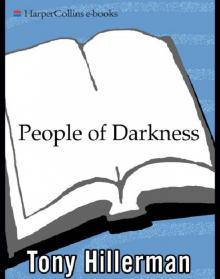 People of Darkness
People of Darkness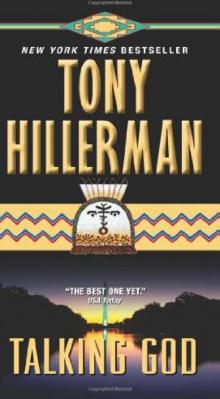 Talking God jlajc-9
Talking God jlajc-9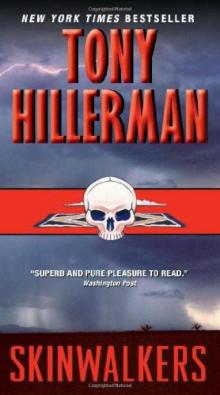 Skinwalkers jlajc-7
Skinwalkers jlajc-7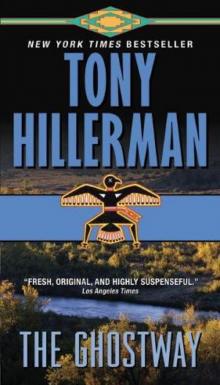 The Ghostway jlajc-6
The Ghostway jlajc-6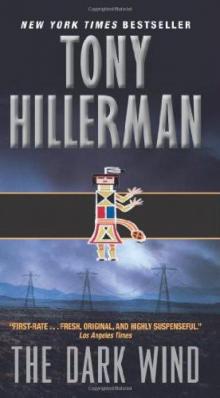 The Dark Wind jlajc-5
The Dark Wind jlajc-5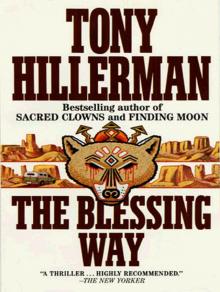 The Blessing Way
The Blessing Way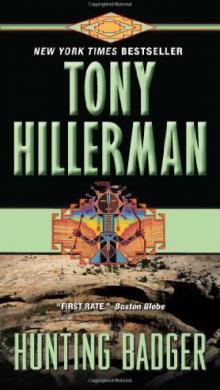 Hunting Badger jlajc-14
Hunting Badger jlajc-14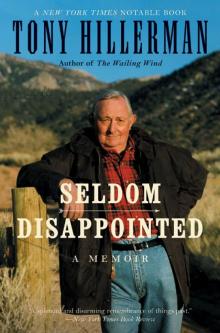 Seldom Disappointed: A Memoir
Seldom Disappointed: A Memoir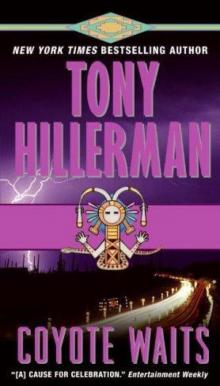 Coyote Waits jlajc-10
Coyote Waits jlajc-10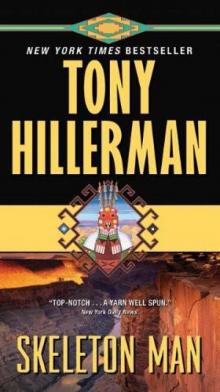 Skeleton Man jlajc-17
Skeleton Man jlajc-17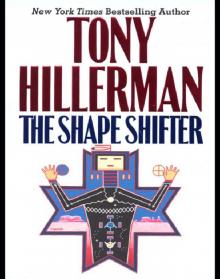 The Shape Shifter
The Shape Shifter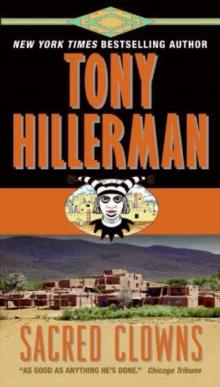 Sacred Clowns jlajc-11
Sacred Clowns jlajc-11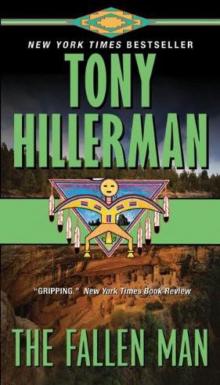 The Fallen Man jlajc-12
The Fallen Man jlajc-12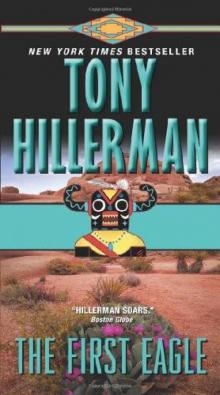 The First Eagle jlajc-13
The First Eagle jlajc-13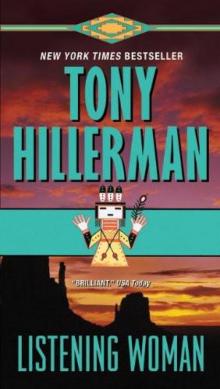 Listening Woman jlajc-3
Listening Woman jlajc-3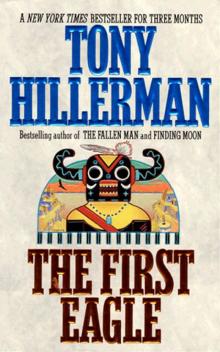 The First Eagle
The First Eagle Skeleton Man
Skeleton Man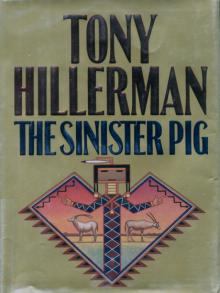 The Sinister Pig jlajc-16
The Sinister Pig jlajc-16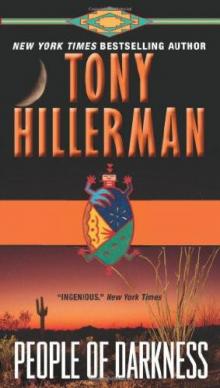 People of Darkness jlajc-4
People of Darkness jlajc-4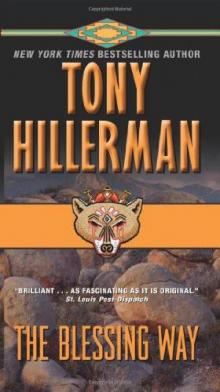 The Blessing Way jlajc-1
The Blessing Way jlajc-1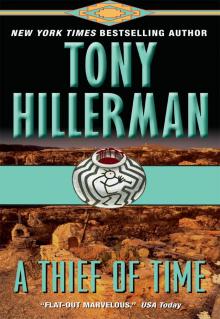 A Thief of Time
A Thief of Time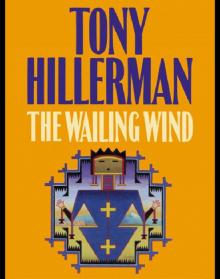 The Wailing Wind
The Wailing Wind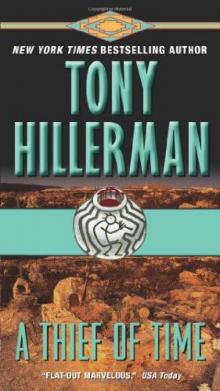 A Thief of Time jlajc-8
A Thief of Time jlajc-8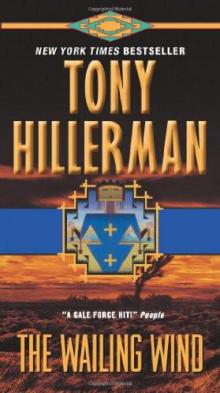 The Wailing Wind jlajc-15
The Wailing Wind jlajc-15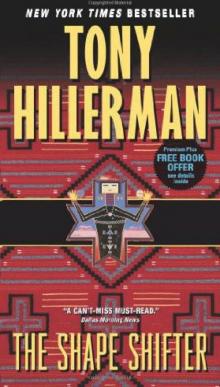 The Shape Shifter jlajc-18
The Shape Shifter jlajc-18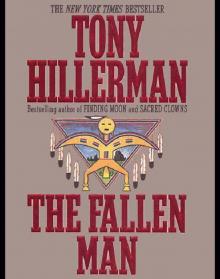 The Fallen Man
The Fallen Man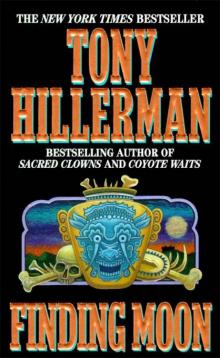 Finding Moon
Finding Moon